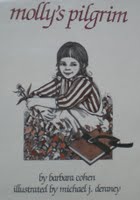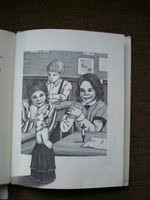 Today, SMASHER author Keith Raffel writes about molding his children’s love of all things literary, and how this love fostered an unforgettable holiday tradition.
Today, SMASHER author Keith Raffel writes about molding his children’s love of all things literary, and how this love fostered an unforgettable holiday tradition.
I’m sure it’s a sign of my egocentricity, but I wanted my kids to love baseball, horse racing, and reading just like me. I struck out on baseball, lost my bet on racing, but hit the jackpot on reading.
Almost from the day my children were born, I started reading to them. Somewhere between ages five and seven, each of my four kids wrestled the book we were reading away from me and started reading it on his or her own. In fact, such pleasure did I get out of a child nestled on my lap, listening with rapt attention, that I suspect --- egoist that I am --- we’d still be having kids if not for biological constraints and my wife’s good sense.
Early reading left an imprint on my kids’ brains. I try not to spoil my four children. I can say no to a Wii, to a car, and a trip to Europe, but not to books. Whatever they want. My 10 year old has turned into a literary snob. He wants to own books, not check them out from the library. He can read a $25 tome in three hours (he’s now busy reading James Rollins). Like his older sisters, he’s inherited my love of books, my bibliophilia.
Bibliophilia is a seasonal disease that, like vampires, flourishes when the nights are long and dark --- in other words, during the holiday season that starts with Thanksgiving.
For 15 years, on the fourth Thursday in November, I’d read MOLLY’S PILGRIM by Barbara Cohen to my pre-adolescent children, nieces, and nephews. The book takes place about a century ago, just after Molly and her parents have moved from a Jewish village in Europe to a small town in Middle America. Molly’s mother speaks no English but is a superb seamstress. As a Thanksgi ving project for school, Molly is assigned to bring in a homemade pilgrim doll. Her mother is ready to tackle the project. Just one problem: the mother doesn’t know what a pilgrim is. When Molly explains the pilgrims were people who left the old country to seek freedom and the right to worship as they pleased, her mother nods with understanding.
ving project for school, Molly is assigned to bring in a homemade pilgrim doll. Her mother is ready to tackle the project. Just one problem: the mother doesn’t know what a pilgrim is. When Molly explains the pilgrims were people who left the old country to seek freedom and the right to worship as they pleased, her mother nods with understanding.
By the time Molly awakens the next morning, her mother has made a beautiful doll that looks nothing like a seventeenth-century Englishwoman. Instead, she’s decided she herself is a pilgrim and made a perfect miniature of herself as a child, dressed like a Jewish villager from Eastern Europe. There’s no time for a redo; Molly brings the exquisite doll into class where a snotty classmate belittles her. Miss Stickley, the kindly teacher, asks Molly if she misunderstood the assignment. Molly explains. The teacher tells the class that Molly and her family are indeed modern-day pilgrims who are escaping prejudice and religious persecution just as those on the Mayflower did.
Even now, after all these years, reading MOLLY’S PILGRIM brings tears to the ey es of this supposedly hard-hearted thriller writer. I love the immigrant story, which --- after all --- is the story of America. The pilgrims who fled first from England on the Mayflower in 1620 were followed by the oppressed from Germany, Ireland, Italy, and Poland in the 19th and early 20th centuries and then in the last generation by refugees from the Soviet Union, Cuba, Vietnam, Haiti, China, Somalia, and other countries who come seeking the freedom and opportunity this country has to offer (shame on those politicians who are trying to renege on the promise of what America represents). MOLLY’S PILGRIM reminds us what this country could and should stand for in words that kids grasp and that pierce an adult’s heart.
es of this supposedly hard-hearted thriller writer. I love the immigrant story, which --- after all --- is the story of America. The pilgrims who fled first from England on the Mayflower in 1620 were followed by the oppressed from Germany, Ireland, Italy, and Poland in the 19th and early 20th centuries and then in the last generation by refugees from the Soviet Union, Cuba, Vietnam, Haiti, China, Somalia, and other countries who come seeking the freedom and opportunity this country has to offer (shame on those politicians who are trying to renege on the promise of what America represents). MOLLY’S PILGRIM reminds us what this country could and should stand for in words that kids grasp and that pierce an adult’s heart.
If you have children, grandchildren, nieces, or nephews under nine, read them MOLLY’S PILGRM this Thursday; it’s still in print. Buy a copy for this year and the next, and the next. I’m willing to bet real money your eyes will water at least a little bit while you’re reading the book aloud to any child.
-- Keith Raffel
Can’t get enough of our holiday blogs? Then come back tomorrow as Lisa Scottoline reveals how, after decades of trying, she finally got her mother to pick up a book.

